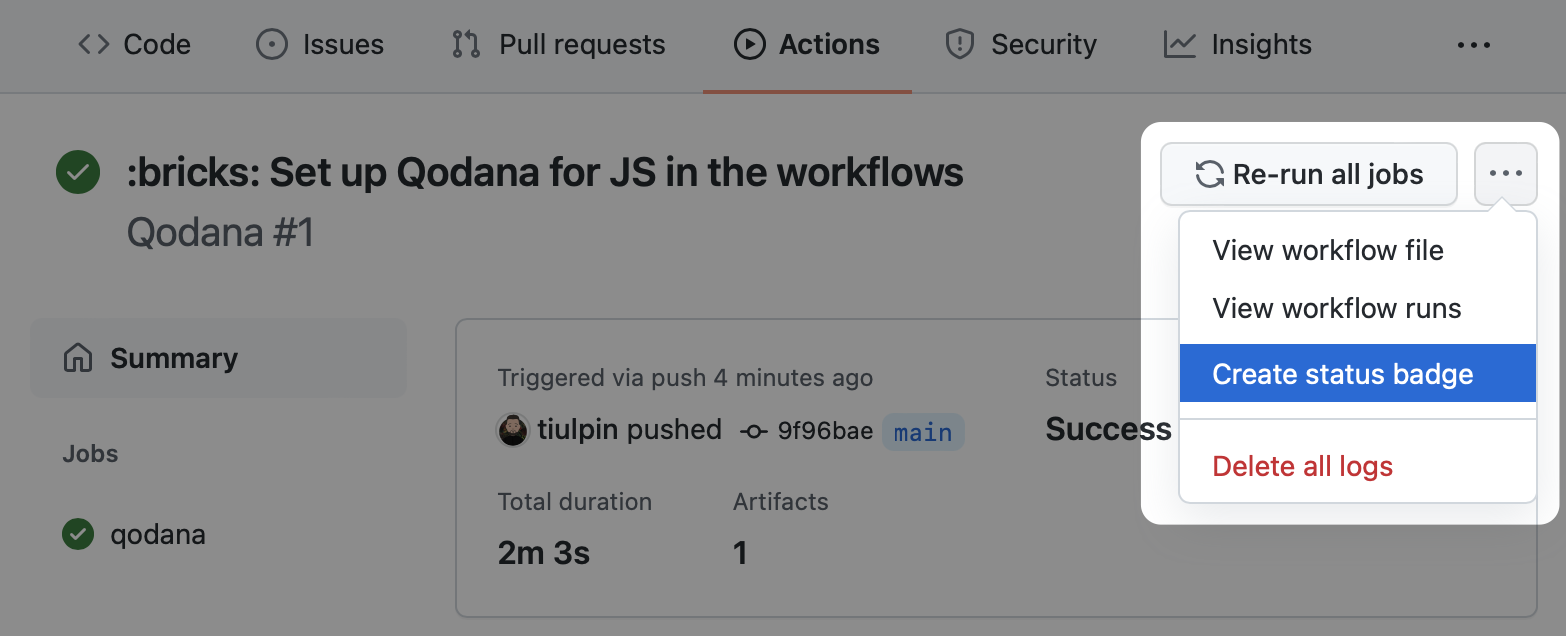GitHub Action
Qodana Scan
Qodana is a code quality monitoring tool that identifies and suggests fixes for bugs, security vulnerabilities, duplications, and imperfections. Table of Contents
- Qodana Scan
💡 This README is about Qodana Scan GitHub action. To learn more about Qodana for Azure Pipelines, please visit ./vsts/README.md.
To configure Qodana Scan, save the .github/workflows/code_quality.yml file containing the workflow configuration:
name: Qodana
on:
workflow_dispatch:
pull_request:
push:
branches:
- main
- 'releases/*'
jobs:
qodana:
runs-on: ubuntu-latest
steps:
- uses: actions/checkout@v3
- name: 'Qodana Scan'
uses: JetBrains/[email protected]Using this workflow, Qodana will run on the main branch, release branches, and on the pull requests coming to your repository.
We recommend that you have a separate workflow file for Qodana because different jobs run in parallel .
You can set
up GitHub code scanning
for your project using Qodana. To do it, add these lines to the code_quality.yml workflow file right below
the basic configuration of Qodana Scan:
- uses: github/codeql-action/upload-sarif@v1
with:
sarif_file: ${{ runner.temp }}/qodana/results/qodana.sarif.jsonThis sample invokes codeql-action for uploading a SARIF-formatted Qodana report to GitHub, and specifies the report
file using the sarif_file key.
💡 GitHub code scanning does not export inspection results to third-party tools, which means that you cannot use this data for further processing by Qodana. In this case, you have to set up baseline and quality gate processing on the Qodana side prior to submitting inspection results to GitHub code scanning, see the Quality gate and baseline section for details.
You can enforce GitHub to block the merge of pull requests if the Qodana quality gate has failed. To do it, create a branch protection rule as described below:
- Create a new or open an existing GitHub workflow that invokes the Qodana Scan action.
- Set the workflow to run on
pull_requestevents that target themainbranch.
on:
pull_request:
branches:
- mainInstead of main, you can specify your branch here.
- Set the number of problems (integer) for the Qodana action
fail-thresholdoption. - Under your repository name, click Settings.
- On the left menu, click Branches.
- In the branch protection rules section, click Add rule.
- Add
mainto Branch name pattern. - Select Require status checks to pass before merging.
- Search for the
Qodanastatus check, then check it. - Click Create.
You can combine the quality gate and baseline features to manage your technical debt, report only new problems, and block pull requests that contain too many problems.
Follow these steps to establish a baseline for your project:
- Run Qodana locally over your project:
cd <source-directory>
qodana scan --show-report-
Open your report at
http://localhost:8080/, add detected problems to the baseline, and download theqodana.sarif.jsonfile. -
Upload the
qodana.sarif.jsonfile to your project root folder on GitHub. -
Append this line to the Qodana Scan action configuration in the
code_quality.ymlfile:
baseline-path: qodana.sarif.jsonIf you want to update the baseline, you need to repeat these steps once again.
Starting from this, GitHub will generate alters only for the problems that were not added to the baseline as new.
To establish a quality gate additionally to the baseline, add this line to code_quality.yml right after the
baseline-path line:
fail-threshold: <number-of-accepted-problems>Based on this, you will be able to detect only new problems in pull requests that fall beyond the baseline. At the same
time, pull requests with new problems exceeding the fail-threshold limit will be blocked and the workflow will
fail.
If you wish to study Qodana reports directly on GitHub, you can host them on your GitHub Pages repository using this example workflow:
- name: Deploy to GitHub Pages
uses: peaceiris/actions-gh-pages@v3
with:
github_token: ${{ secrets.GITHUB_TOKEN }}
publish_dir: ${{ runner.temp }}/qodana/results/report
destination_dir: ./Hosting of multiple Qodana reports in a single GitHub Pages repository is not supported.
You can set up a Qodana workflow badge in your repository:
To do it, follow these steps:
- Navigate to the workflow run that you previously configured.
- On the workflow page, select Create status badge.
- Copy the Markdown text to your repository README file.
Most likely you won't need other options than args: all other options can be useful if you are configuring multiple Qodana Scan jobs in one workflow.
| Name | Description | Default Value |
|---|---|---|
args |
Additional Qodana CLI scan command arguments, split the arguments with commas (,), e.g. -i,frontend,--print-problems. Optional. |
- |
results-dir |
Directory to store the analysis results. Optional. | ${{ runner.temp }}/qodana/results |
upload-result |
Upload Qodana results as an artifact to the job. Optional. | true |
artifact-name |
Specify Qodana results artifact name, used for results uploading. Optional. | qodana-report |
cache-dir |
Directory to store Qodana cache. Optional. | ${{ runner.temp }}/qodana/caches |
use-caches |
Utilize GitHub caches for Qodana runs. Optional. | true |
additional-cache-hash |
Allows customizing the generated cache hash. Optional. | ${{ github.sha }} |
use-annotations |
Use annotation to mark the results in the GitHub user interface. Optional. | true |
github-token |
GitHub token to be used for uploading results. Optional. | ${{ github.token }} |
All the issues, feature requests, and support related to the Qodana GitHub Action are handled on YouTrack.
If you'd like to file a new issue, please use the link YouTrack | New Issue.
This repository contains source code for Qodana GitHub Action and is licensed under Apache-2.0.
View license information for the Qodana Community images.
Qodana Docker images may contain other software which is subject to other licenses, for example, Bash relating to the base distribution or with any direct or indirect dependencies of the primary software.
As for any pre-built image usage, it is the image user's responsibility to ensure that any use of this image complies with any relevant licenses for all software contained within.
Using the Qodana EAP Docker images, you agree to JetBrains EAP user agreement and JetBrains privacy policy. The docker image includes an evaluation license which will expire in 30-day. Please ensure you pull a new image on time.


